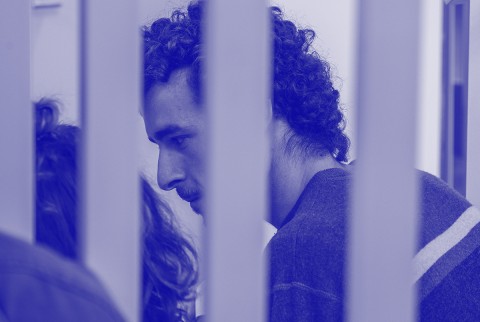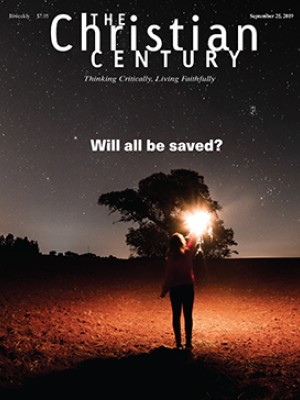Tasting salvation during a fellowship meal at a maximum security prison
None of us wants it to end, because we know we'll never see each other again.

The correctional officer escorts Lauren and me to the prison’s visitors’ center, where she ushers us into an office and tells us to sit and wait. “The chaplain will see you soon,” she says as Lauren and I find a couple of chairs. We’re nervous, anxious for the prison administration to approve the class we want to teach. After we wait for five minutes, ten minutes, 15 minutes, a half hour, the chaplain bursts in and we jolt up from our seats. He acknowledges us with a nod as he lifts his cowboy hat from his head and drops it on the table.
“So y’all gonna teach some classes here, are ya,” he drawls while staring at us, his eyes shifting from Lauren to me, from me to Lauren, studying our faces and clothes and bodies. His gaze and the long silence make me antsy, so I start bumbling, thanking him for meeting with us, appreciating his willingness to approve our class, complimenting the prison staff for their hospitality, saying anything and everything that might ingratiate us to him.
Read our latest issue or browse back issues.
“Y’all can take a seat now,” he interrupts. “I gotta tell you a thing or two before I’ll sign off on your paperwork, to get you approved.” Lauren and I plop into our chairs; he stays standing, looking down at us. “The most important thing you need to know,” he booms, as if speaking from a pulpit, “you need to understand that they’re not like us. They don’t think like us. They don’t have the same kind of mind that we do. They’re criminals. They’re corrupted.”
My heartbeat quickens, my veins pulse with panic. “I’ve been here for 20 years, and I’ve seen it all,” he proclaims. “I know what goes through their demented minds.” Trying to stay calm, I take a deep breath, hoping my checks won’t turn red. I force a half smile and ignore the sick feeling in my gut. “When you walk into that cellblock,” the chaplain goes on, “when the inmates stroll into your class, they are going to look you up and down, and you can’t see it but what they’re doing, what they’re thinking, what they’re imagining, is what it would be like to rape you.” I’m nauseous; Lauren’s frozen.
“Before you go in there,” he says, “you’ve gotta know that they are not like us. Repeat after me: they are not like us.” Lauren and I glance at each other, bewildered and dumbstruck. Raising his voice, the chaplain commands us again: “Say it, they are not like us.”
My mind gags on his words; my stomach revolts from his demands. I look down at the table, the floor, the wall, the ceiling, the door—my eyes dart here and there, searching for an escape, for a distraction.
“You can’t go in there unless you say it. They are not like us.”
Lauren and I turn to each other and, silently, give each other permission to say what we do not believe—to speak lies, to give the chaplain what he wants so he can sign his stupid piece of paper, our ticket into prison. “They are not like us,” we mumble.
“Louder,” he demands. So we say it louder. “Again,” he says. So we say it again, and I feel like I’m making a false confession, like I’m denying my faith in a God who creates all of us in the divine image. As I declare the chaplain’s words, I am betraying Jesus, the one who told us that when we visit prisoners, we visit him. I renounce my faith, and the chaplain deems me fit for prison work.
I am a Mennonite. Our tradition dedicates us to truth telling. Our slim confession of faith—only 24 articles—devotes a whole page to our Christian pledge to the truth in all aspects of our lives. “We commit ourselves to tell the truth, to give a simple yes or no, and to avoid swearing of oaths.” So reads the first sentence of article 20 of The Confession of Faith in a Mennonite Perspective.
To be a Mennonite is to root ourselves in a history of people, of 16th- and 17th-century Anabaptists, who refused to recant their faith and were persecuted for their witness, martyred for their stubborn truthfulness. To follow their example—to be killed as a result of a confession of faith—is what our confession calls our baptism of blood: “The baptism of blood, or baptism of suffering, is the offering of one’s life, even to death.” In a 1562 Anabaptist collection of martyr stories, the deaths are described as sacrifices to truth, their martyrdom a result of “their hearts’ confessions . . . which they spoke with their mouths and have sealed with their blood.”
To deny my faith betrays my people. When I speak the chaplain’s words, I shun my ecclesial ancestors. His personal declaration of faith, which I now must confess, renders me unfaithful to my tradition. I sacrifice what I know to be true in order to get into prison. I recant my conviction that I am joined to people within the facility, that we are children of the one God, siblings by faith. “There is one body and one Spirit,” according to the epistle to the Ephesian church, “one Lord, one faith, and one baptism.” In Christ there is no distinction between slave and free, between members of the body enslaved by the carceral state and my freedom outside of the penal institution’s cages.
According to God’s truth, I am like them and they are like me. I retract all of this during the chaplain’s inquisition. I surrender my voice to untruth, my body possessed with the prison’s demons, spirits sent from the father of lies.
With authorization cards in hand, we return every Monday for the next three months. Each time, a correctional officer escorts us through gate after gate, door after door, passing through chain-link fences and spirals of razor wire, down an elevator without any buttons, through cold corridors, deep into the catacombs of North Carolina’s maximum-security prison. There, buried, is a classroom.
Lauren and I bring seminarians from a local university to learn alongside the students locked in the facility. The incarcerated students welcome us with warm smiles, shaking our hands. Each week we discuss the assigned books and essays. In pairs—one partner from inside the facility, the other from outside—they workshop their writing assignments, stories about their lives, episodes from childhood, painful memories and joyful ones. The theme of our course is spiritual autobiography, an opportunity for the sharing of personal stories to join lives together. The semester gives them time to know each other. Our class becomes a time of fellowship, of communion.
This is a vision of the kin-dom of God, to borrow a phrase from Ada María Isasi-Díaz. In her book En la lucha, the mujerista theologian describes la comunidad de fe as la familia de Dios—the community of faith as the family of God, where we become kin. “For us Latinas,” Isasi-Díaz explains, “salvation refers to having a relationship with God, a relationship that does not exist if we do not love our neighbor.” God’s kin-dom stretches our relationships across divisions, in defiance of barriers imposed by society. Side by side, around tables in a cinder block classroom, we relearn who belongs to us and to whom we belong, as we catch glimpses of, as Isasi-Díaz would put it, “the unfolding of the kin-dom.”
For our last day of class, the warden permits us to bring food. We arrive at the facility with casseroles and collard greens, potato salad and fried chicken, pies and cupcakes, lemonade and sweet tea—all in clear, plastic containers as required by the prison administration, so the guards can make sure we aren’t smuggling contraband in our corn pudding.
The chaplain meets us in the lobby before we go through security. “Well, aren’t you all a bunch of sweethearts, you brought me supper!” He bends his nose into the chicken. “You know, the inmates have already been through the chow line, they’ve done had their evening feeding.” His smirk turns stern as he walk over to the guard in charge of processing our clearance. “They can’t bring in this here food. Who signed off on the request?” He grabs the paperwork, his swagger reminding the officers that he outranks them. We watch as they discuss the matter in the office, on the other side of the plexiglass, checking signatures and titles and chain-of-command protocols.
The chaplain glances up at me through the glass. I smile, shrug my shoulders, and give him a wink, because I know he has discovered a note from the statewide office of chaplaincy services—authorization from my friend, his boss’s boss.
A guard inspects our containers while we walk through metal detectors. “Be careful in there,” the chaplain says as he stands there, glaring. “Inmates look friendly, but they’re dangerous.”
After we pass through the security station, two of the guards escort us through the familiar labyrinth of halls to the classroom in the concrete bowels of prison. An incarcerated student named Melvin stands at the door and welcomes each of us with a heartfelt, two-handed handshake. “I’m glad you’re here,” he tells us. His face beams; his eyes are watery. As we spread out our potluck meal on a table, I apologize for our delay and explain what happened with the chaplain. “He hasn’t been the same after the fight,” says Melvin. He slowly shakes his head, describing a full-scale dining hall brawl in recent history. The chaplain happened to be there and suffered severe blows. “He’s been possessed with a fear ever since.”
In the classroom the men offer us Styrofoam cups that warm our hands. The unit supervisor has given her approval for the imprisoned students to make coffee, a significant privilege. Soon each person makes a plate for himself, finding a chair around the tables. We rest in the silence of one another’s company while we chew our first mouthfuls—until a student named Scotty leans back, a greasy drumstick in his hand, and shouts, “I forget food tastes so good!” Another student adds that it tastes so good because of the people in the room.
We talk and laugh and eat for as long as the guards let us. “Looks like this might be our last supper!” Melvin shouts. No one wants the meal to end, because we know we won’t see each other again. We want to hold onto the people beside us, grasping at our newfound friendship, resting into the divine love there among us—a taste of salvation, the ever-unfolding kin-dom of God.
Before we leave I tell the incarcerated students that I’m grateful for their love, that their love gives me hope for a world without prisons, a society without cages—my hope in a God who saves people from the hell of incarceration. “Thanks for sharing your love with us,” I say. “Thanks for letting us see your love for each other.” I tell them that I’ll keep them in my prayers and that I’ll remember them whenever I think of Assata Shakur’s words, which we read during the semester—that “love is contraband in Hell, ’cause love is an acid that eats away bars.”
A version of this article appears in the print edition under the title “Where love is contraband."






